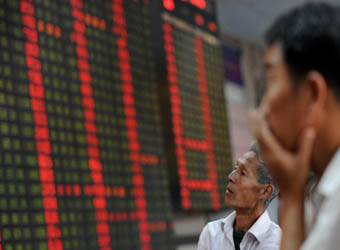Most Asian stock markets ended lower on Friday after the weaker close stateside and as global bond yields rose.
The Nikkei 225 declined 0.32 percent, or 64.97 points, to close at 19,929.09 and the Kospi slid 0.33 percent, or 7.94 points, to end at 2,379.87.
Down Under, the S&P/ASX 200 tumbled 0.96 percent, or 55.196 points, to close at 5,703.567, with broad-based losses across all its sub-indexes. Its energy sub-index led the losses and closed down 2.07 percent.
Shares in greater China closed mixed after cautious trade. The Hang Seng Index closed lower by 0.49 percent, or 124.37 points, at 25,340.85. On the mainland, the Shanghai Composite rose 0.16 percent, or 5.1687 points, to close at 3,217.6127 and the Shenzhen Composite edged up 0.185 percent, or 3.5466 points, to end at 1,918.1324.
Movements in the bond markets were in the spotlight as sovereign bond yields rose overnight. Bond yields move inversely to prices.
The selloff in the bond markets came amid expectations of more hawkish central bank policy.
The benchmark 10-year U.S. Treasury yield rose to nearly two-month highs overnight. At 4:12 p.m. HK/SIN, 10-year yields were at 2.38 percent, off a high of 2.39 percent seen earlier in the session, compared with the 2.33 percent seen earlier in the week.
In the previous session, the German 10-year bund yield crossed the 0.5 percent level for the first time since January 2016. The yield was at 0.57 percent at 4:11 p.m. HK/SIN.
National Australia Bank economist Tapas Strickland said the selloff in bonds came after a weak French 30-year bond auction. That was reinforced by minutes from the European Central Bank indicating that officials had discussed removing the Bank’s easing bias.
“The clear implication here is that buyers have less appetite for European debt as they expect yields to head higher and for the ECB to gradually remove policy accommodation in the near future,” Strickland said in a Friday morning note.
In Japan, the Bank of Japan stepped up buying of five- to 10-year Japanese government bonds (JGB) under its quantitative easing program, Reuters reported. The BOJ has set a target of keeping the 10-year JGB yield at zero.
This week, the 30-year and 40-year JGBs have touched their highest yields since February of 2016, while the 10-year touched a five-month high of 0.105 percent, Reuters reported.
The BOJ’s bond-buying sent the yen lower, with the greenback fetching 113.72 yen at 4:00 p.m. HK/SIN, yen, compared with around 113.10 before the bond moves.
Oil prices sank after settling moderately higher overnight. Brent crude futures fell 1.58 percent to trade at $47.35 a barrel and U.S. crude futures declined 1.8 percent to $44.70.
Energy stocks in Australia sold off following the drop in oil prices. Australia’s Santos shed 2.64 percent and Oil Search closed down 1.97 percent.
Stephen Innes, a senior trader an OANDA, told CNBC that he has been “quite nervous” about developments in the oil patch. “There is an air of uncertainty around the commodity patch given oil markets’ far-reaching implications across all asset classes,” he added.
In South Korea, shares of Samsung Electronics were down 0.42 percent after the electronics giant said profit for the second quarter was expected to increase 72 percent on-year.
Meanwhile, Korean Air Lines closed down 2.18 percent following news that police had conducted a raid at the company’s headquarters in Seoul, South Korea.
Shares of commodities trader Singapore-listed Noble Group were down 9.38 percent after jumping 36 percent in the previous session. It remained unclear what drove the sudden rush into the stock. Shares of the company were down more than 65 percent year-to-date.
In economic news, U.S. private payrolls data from ADP on Thursday indicated that 158,000 jobs were created in June, compared with the 185,000 expected. The ISM non-manufacturing index, however, indicated that non-manufacturing activity grew, coming in at 57.4 in June, compared with the 56.5 forecast.
Data out of the U.S. on Thursday encapsulated the current economic conundrum, said Michael McCarthy, chief strategist at CMC Markets.
“Around the globe, an ongoing increase in activity is only weakly lifting employment, and both wages and prices are showing little signs of life. A low inflation environment endangers the withdrawal timetable and increases market risks,” McCarthy warned in a Friday note.
Ahead, nonfarm payrolls data due Friday in the U.S. were likely to also be closely watched by markets.
In currencies, the euro was mostly flat after strengthening overnight on the back of the release of the ECB’s minutes. The common currency traded at $1.1419 to the dollar at 3:58 p.m. HK/SIN, compared with levels around the $1.13 handle seen earlier in the week.
Meanwhile, the dollar index, which measures the dollar against a basket of rival currencies, firmed to trade at 95.880 at 3:58 p.m. HK/SIN — but remained lower than the 96 handle seen for most of the week.
Data for China’s June foreign exchange reserves released after the market close showed reserves rose for a fifth straight month, but remained lower than forecasts, Reuters reported. Reserves rose by $3 billion to come in at $3.057 trillion in June, compared to the $3.06 trillion forecast.
Stateside, stocks closed lower, with the Dow Jones industrial average falling 0.74 percent, or 158.13 points, to close at 21,320.04.
Source: CNBC


